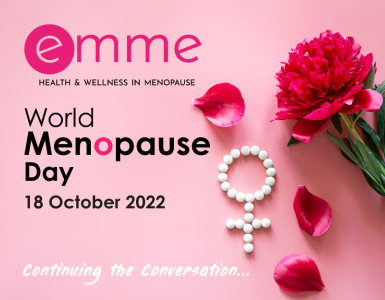The menopause is a stage of life that all women experience, usually in her 40s and/or 50s although sometimes it can begin sooner than that
Given that it affects half of the adult population of the world, it seems surprising that it isn’t often openly spoken about. In years gone by, the most exposure the menopause would get, would be the “her indoors” type jokes told by men who quite simply didn’t, or wouldn’t, understand this time in a woman’s life.
But now, thankfully, the conversation is being opened up around the topic of the menopause, making this often lonely and confusing time, much easier to live through. To help, here’s some of the more common questions surrounding the menopause to help inform and empower women experiencing this normal life stage.
What’s the difference between the perimenopause and the menopause?
The perimenopause describes the time in a woman’s life prior to experiencing the menopause. It usually happens when a woman is in her 40s, but it can be earlier than that, and not all women experience the perimenopause.
It begins when a woman’s oestrogen levels begin to fall, and causes similar symptoms to the menopause, sometimes to a lesser extent. Symptoms of the perimenopause include a change in the regularity, flow and pain of periods, mood swings, night sweats and hot flushes.
This may continue for up to ten years, before a woman’s oestrogen levels drop further and she’s in her menopause. A woman is said to be post-menopausal when she hasn’t had a period for 12 consecutive months.
Throughout the perimenopause and the menopause, you may feel distracted, unable to concentrate, forgetful, foggy brained and unlike your usual self. It’s important to remember that this is normal. Speaking to women of a similar age will help you feel a little more normal, and opening up to your partner about how you’re feeling can help significantly.
I feel really emotional, and I don’t know why, is this menopause related?
Just like we may have experienced when we were pre-menstrual, our moods can dip and change on a whim when we’re going through the menopause. This is caused by an imbalance of hormones, as oestrogen levels dip.
It’s perfectly normal to feel tearful, anxious or depressed during the menopause, but that doesn’t mean you have to feel this way. Eating a healthy diet and taking plenty of exercise will help to lift your mood, and practising meditation and mindfulness is also very helpful to many women.
If you’re feeling more than tearful or blue, it’s important to seek medical help, so make an appointment to see your GP.
Would changing my diet help my symptoms?
You may notice that as you go through your perimenopause and menopause that your weight changes. Some women find that they gain weight, and find it harder to maintain their weight.
Healthy eating at this time of life is key. Reducing your intake of sugars and saturated fats and switching from white, processed carbs, to brown, wholemeal ones can help with weight management. To help to keep your bones strong, eat a calcium rich diet by including plenty of low fat dairy or calcium enriched dairy free products, spinach and nuts. A daily vitamin D supplement, especially in the darker months, will also help to protect your bones.
I’ve noticed changes in my toilet habits, is this normal?
Yes! Many women experiencing the menopause will feel the need to empty their bladder more frequently. You may also experience frequent episodes of cystitis (a water infection). Both are due to the effects of declining oestrogen levels.
You may also notice vaginal dryness, which can be helped by using vaginal pessaries and lubricating gels.
If any of these symptoms are bothering you, speak to your GP who can suggest potential treatments with you.
For more information, the British Menopause Society website and the US North American Menopause Society are great resources for insight into the menopause and HRT.
















